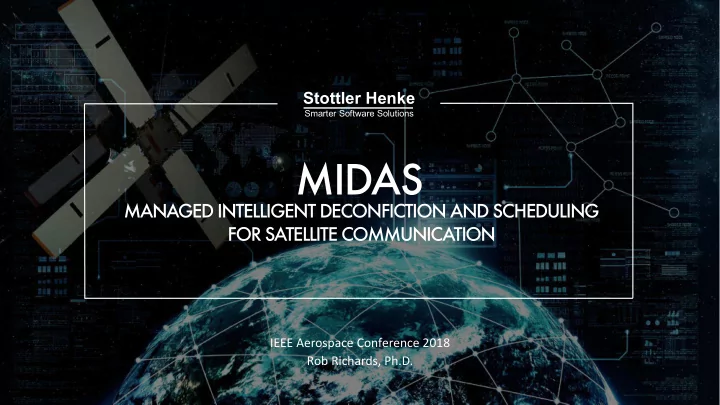

Stottler Henke Smarter Software Solutions MIDAS MANAGED INTELLIGENT DECONFICTION AND SCHEDULING FOR SATELLITE COMMUNICATION IEEE Aerospace Conference 2018 Rob Richards, Ph.D.
OVERVIEW OF CHALLENGE The Air Force Satellite Control • Network (AFSCN) provides support for the operation, control, and maintenance of a variety of Department of Defense and some non-DoD satellites (NOAA). Each constellation of satellites operate • independently Requests are put through a central • scheduling organization to deconflict competing requests Constraints • Line of sight between the antenna • and the satellite is required Limited ground stations •
CLIENT: AIR FORCE SPACE COMMAND CLIENT: AIR FORCE SPACE COMMAND CAVALIER NEW BOSTON MALMSTROM MINOT CAPE COD OFFUTT F .E. WARREN BEALE BUCKLEY SCHRIEVER ONIZUKA PETERSON VANDENBERG EDWARDS SOCORRO HOLLOMAN EGLIN CAPE CANAVERAL HOUSTON PATRICK
SATELLITES & GROUND STATIONS Over 450 contacts performed per day • with over 100 changes to support requests daily Before MIDAS: Generated solutions • were time-intensive and required a high-level of expertise Fluctuating priorities cause • complications that require reshuffling communication plans
SOLUTION OBJECTIVES Provide automated scheduling and deconfliction module for AFSCN operations Minimize unnecessary conflicts within request constraints Use existing expert knowledge to guide deconfliction process Flexibility to integrate with various systems at different levels • Read and write existing file formats Provide a general purpose scheduling service accessible via JSIP (Joint Systems Integration Planning)
HISTORY OF FAILED ATTEMPTS Hundreds of millions of dollars spent on • previous failed solutions
LEVERAGE AURORA INTELLIGENT SCHEDULING Utilizes scheduling heuristics from • expert schedulers in multiple domains Complex constraint support • Mixed-mode scheduling providing both • forward and backward scheduling, available on a task-by-task basis Schedule Rationale – Aurora includes • the rationale for each task on why it was schedule where it was schedule
AURORA INTELLIGENT SCHEDULING TOOL • Aurora: general architecture for creating intelligent scheduling systems • Aurora mimics human scheduling decision processes • Typically algorithms are linear (or nearly so) and run very fast • Plug-ins for different steps in the scheduling process (preprocessing, ordering queue , selecting resources/time windows, propagating constraints, solving conflicts, post-processing optimization) • Library of general and specific methods/heuristics for each
AURORA RELATED SUCCESSES NASA Near-earth network antenna • scheduling Ballistic Missile Engagement & Sensor • Planning Various NASA Applications • Space Launch System (SLS) • Ground Processing (GP) Shuttle MRO • Space Station Processing Facility • (SSPF) Boeing 787 Dreamliner and other • aircraft production scheduling More optimal than all competitors in every domain tried
AURORA’S ADAPTABLE UI
SOLUTION: MIDAS MIDAS MIDAS: Managed Intelligent Deconfliction and Scheduling Mission requires 100% support allocation Handle real-time events that require within time/resource constrained requests to be rescheduled (moved to environment (little offloads) another resource, etc.) High resource contention Strong goal of scheduling 100% of requests with tight time constraints System must be able to evolve Air Force Satellite Complex requests: Control Network Resource Combinations (AFSCN) Scheduling Allow for rule exceptions to Challenges deconflict competing requests Multiple satellite priorities for same satellite Integration of high priority Soft constraints/Preferences missions i.e. Launches, Satellite (duration, sites, antenna, etc.) Emergencies Human edits, dynamic changes, resource failures
SSI – USER INTERFACE Satellite Scheduler’s Interface (SSI) Redacted Mimics ESD Network Display • Display tasks, identify conflicts • Move tasks with drag and drop • Review task properties in Task Detail Display • Currently supports MIDAS scheduling • Import SAT, PAP , DEFT files • Display and scheduling based on real ESD • Environment file Baseline scheduling upon load, bottleneck • scheduling on demand
AURORA – SATELLITE SCHEDULING Adapted Aurora’s suite of scheduling • Redacted algorithms for satellite domain Bottleneck Avoidance Algorithm • developed Schedule the least flexible tasks • before the most flexible tasks. Flexibility is defined using several dimensions: temporal flexibility (like the LEO-before-HEO approach), the degree of contention for resources in that time window, and the current state of tasks that have already been scheduled.
MIDAS – BOTTLENECK AVOIDANCE MIDAS Resolved 74% of conflicts without rule-bending After bottleneck: 479 conflicted requests Initial schedule: 1,846 conflicted requests 2,847 One week of requests pre-deconfliction requests
MIDAS – BENDING THE RULES MIDAS • Leverage existing expert knowledge Relax or modify constraints to resolve • unavoidable conflicts • Support for “assisted” conflict resolution Change Change Move out of Shorten Prepass Shorten Pass Slide/Station Revolution Window
MIDAS – AUTOMATED CAPABILITIES MIDAS Delivered features Aurora bottleneck avoidance scheduling Automatic deconfliction User defined business rules for special cases, requires just a few minutes individually or in combination Conflict resolution that requires multi step solutions ~97% fully automatic 24 hour deconfliction Frequent feedback and Use of past de-confliction precedents testing by 22 S0PS / familiar user interface
CONCLUSION • SCN scheduling largely consists of resolving disputes between competing support requests • MIDAS can now solve in minutes what previously took highly skilled human schedulers circa 8 hours per day • About half of the conflicts can be solved by shuffling the requested supports within the constraints supplied with the requests. • The other half require some degree of relaxation of the constraints: MIDAS can thus automatically resolve the large majority of remaining conflicts • Using a representation of parameterized business rules, • More accurate study of future loading (and associated required resources) • More accurate response to what-if questions relating to the impact of failed resources and required emergency supports • Cost 2 orders of magnitude less expensive than history of failure
Recommend
More recommend